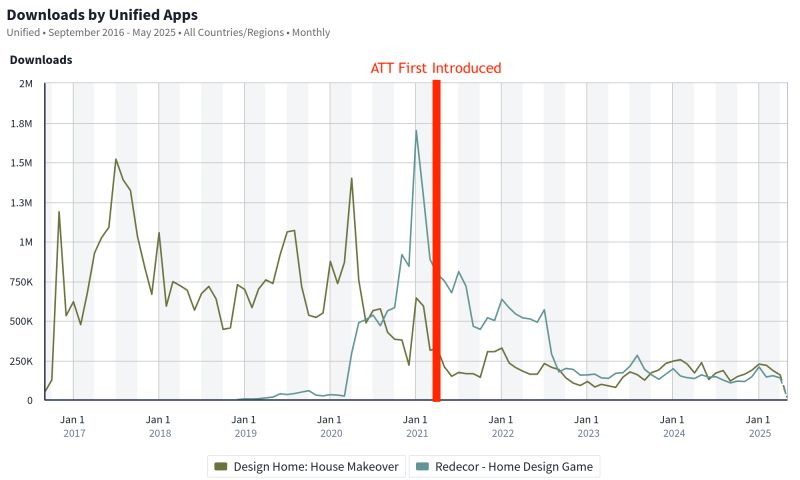
Forget the 30% – Bring Back IDFA!
Journal 7 Phillip Black May 5

𝗙𝗢𝗥𝗚𝗘𝗧 𝗧𝗛𝗘 𝟯𝟬%—𝗕𝗥𝗜𝗡𝗚 𝗕𝗔𝗖𝗞 𝗜𝗗𝗙𝗔 𝗙𝗢𝗥 𝗥𝗘𝗔𝗟 𝗠𝗢𝗕𝗜𝗟𝗘 𝗜𝗡𝗡𝗢𝗩𝗔𝗧𝗜𝗢𝗡 Blake Robbins and Mitch Lasky argue in Gamecraft Ep.18, “The Mobile Gaming Duopoly,” that Apple and Google have squeezed innovation out of mobile gaming. Mobile innovation hasn’t vanished; instead, it has splintered. And while it didn’t vanish, it 𝘩𝘢𝘴 slowed, but the culprit isn’t IAP or a top-grossing chart—it’s ATT.
Robbins and Latsky state, “There’s this race to the highest ROI category…casino, match3, etc. Because the UA spend required to bring those games to mass market scale forces you out of innovative content and into these tried-and-true play patterns.” Yet, this is how *all* markets work!
As capital expenditure rises, it seeks less risky returns. Venture capital is a perfect example; investors need more market traction at each successive investment stage to write bigger checks. “Tried-and-true” genres like match-3 (M3) run dry of innovation as they mature. Instead, innovation inherently evolves through specialization. M3 is the prime example! M3 naturally splintered into specialized subgenres over the past five years, like 3D match, match-2, and match-pair (e.g., Tile Busters).
An evolution into specialization isn’t unique to mobile; it’s how all knowledge works. Philosophy first covered the entire range of knowledge before splitting into natural philosophy and political philosophy. Natural philosophy splintered into math, astronomy, chemistry, etc. Specialization is not stagnation; it is the expected end state when ideas diffuse and the easy wins are mined.
Robbins and Latsky go on to discuss the “dark side of F2P”: “whale-hunting.” Conversely, the hypertargeting revolution initiated by Facebook and enabled on mobile via IDFA fostered small, niche businesses, like Dollar Shave Club, and game genres like style décor. Without hypertargeting, these genres were deprived of the oxygen they needed to survive. The result has been a decline in the genre’s existing titles and the failure to launch of others (RIP Drest).
Mobile innovation first splintered, like all knowledge, but it’s ATT, not whale hunting or top-grossing, that’s impeding further innovative growth. Reducing platform fees might help everyone’s margins, but won’t spark new innovation.







